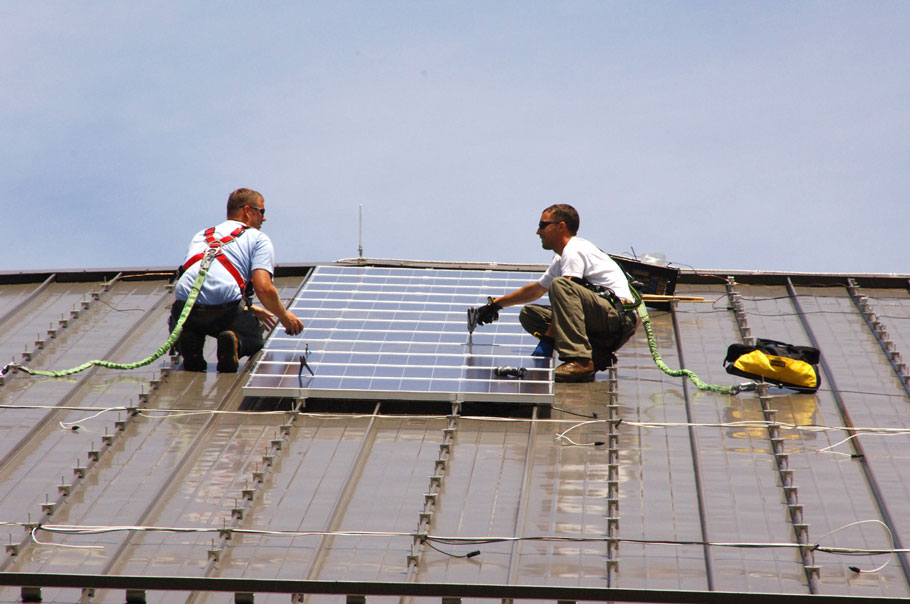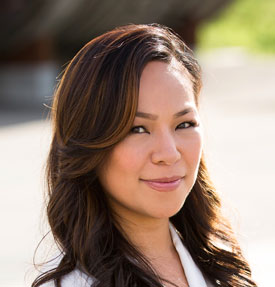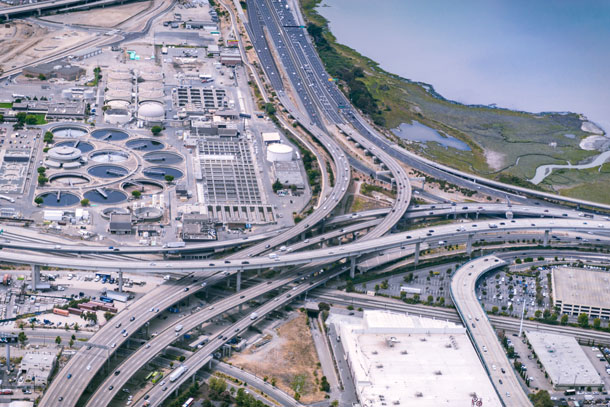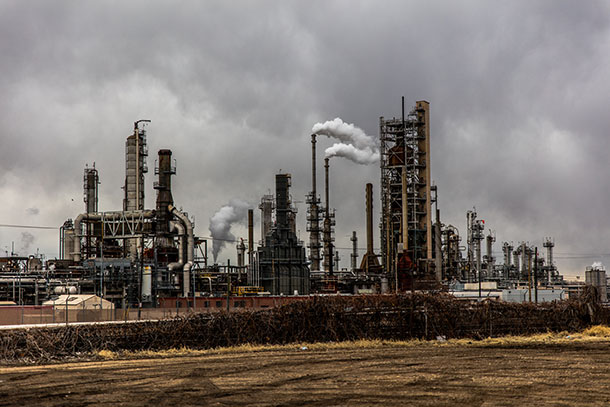A Green New Deal For All
Air Date: Week of February 8, 2019

The solar energy industry can create jobs through the manufacture as well as the installation of solar panels. (Photo: Fort Dix / U.S. Army Environmental Command, Flickr CC BY 2.0)
Support for a “Green New Deal,” drafted by freshman Congresswoman Alexandria Ocasio-Cortez (D-NY) and Senator Ed Markey (D-MA), is solidifying among environmental groups. Over 600 of them recently signed a letter calling on Congress to bring forth Green New Deal legislation, to create jobs as well as alleviate environmental health risks for vulnerable communities. Vien Truong is the CEO of Green For All, one of the groups that signed on to the letter. She talks with host Steve Curwood about why environmental justice and economic justice go hand-in-hand.
Transcript
CURWOOD: It’s Living on Earth, I’m Steve Curwood.
About half of families in the US have savings of less than $500, and virtually all of the US is at risk from pollution and the deleterious effects of climate disruption. So to boost the economy and protect the environment at the same time, some 600 progressive economic and environmental advocacy groups are pushing for a Green New Deal. Congresswoman Alexandria Ocasio-Cortez of New York and Senator Ed Markey of Massachusetts are both Democrats working on a draft resolution for Congress. They say the US needs "a national, social, industrial and economic mobilization at a scale not seen since World War II." Green For All is a member of this coalition in Oakland, California. It calls for a green economy to help lift people out of poverty. Vien Truong is CEO of Green For All and she joins us now, Welcome to Living on Earth!
TRUONG: Thank you for having me.
CURWOOD: So first tell me, why is your organization, Green For All, pushing for a Green New Deal?

Vien Truong is the CEO of Green For All (Photo: Courtesy of Green For All)
TRUONG: We've been pushing on this for a while, since 2007. And it's because our leaders and our people know both the dual problems of pollution and poverty are especially hurting low-income communities and communities of color. So Green For All has been pushing for a new economy, a new green economy strong enough to lift people out of poverty. And that's the work that we're doing, and that's what work we're excited to pick up and continue doing as part of the Green New Deal.
CURWOOD: Vien, I understand that environmental justice is something that's pretty close to your heart. Tell me about your experiences and how they shaped what drives you now.
TRUONG: Yeah, I grew up in Oakland, and I'm the youngest of 11 kids. My family came here from Vietnam after the war, as part of the boat people refugees. And the first jobs they could find were working on farmlands as migrant farm workers, picking strawberries and snow peas, in these toxic fields. And then they graduated to working in sweatshops in Oakland, during the crack years. We lived in a community where one out of four people had asthma, where our schools were going from neglected to dangerous, where most of my friends were in and out of jail or dropped out. The local newspaper once created a mapping system to look at what the life expectancy is for people in my community versus others. And they saw that people who lived in my zip code, 94601, were living 12 years less than people who lived in a more affluent community just seven miles away. And so for me, it is an urgency around how do I make sure that my kids don't get robbed of their 12 years just because of where we live, or because of the zip code in which we're in? And not only am I doing that for my kids but people who live in communities like mine across this country.

Vien Truong’s hometown of Oakland, California is a network of freeways that pollute the air of low-income communities. (Photo: Rodrigo Soares on Unsplash)
CURWOOD: Now, briefly summarize, what is the pitch here, how do you protect the environment, at the same time, have more sustainable lives for people?
TRUONG: It's easy, you know, solar panels don't put themselves up. Smart batteries, wind turbines can't manufacture themselves. We can create jobs in creating solar panels and installing them on rooftops, we can create jobs in the Midwest, in areas that have been de-industrialized, post-industrialization, in building the turbines, building the smart batteries and smart technology. We also want to see smart grids, we want to see more investment into safe homes and housing, through energy efficiency, through making sure that we have the right materials in our homes that are non-toxic, we want to make sure we're investing in the local businesses and local communities. That's the exciting part of the Green New Deal for me. The opportunities that goes from helping to invest in small independent farmers to help us with planting crops that actually pulls carbon out of the air, and make sure that we're growing foods and vegetables and sequestration in our country, to making sure it's smart manufacturing; to making sure that we are actually creating economic diversity across the country, I think that's the opportunity in the Green New Deal here.
CURWOOD: Now, recently there was a letter that some hundreds of, actually of different environmental groups signed, saying that, hey, when it comes to a Green New Deal, they don't want to see market-based mechanisms and certain technology options. So when they talk about market-based mechanisms, they're talking about carbon and emissions tradings and offsets, that sort of thing. Sounds like you see more nuance there.
TRUONG: You know, I think if we're really looking at the scale and the level of the Green New Deal that we need to be at, in order for us to have a sustainable future, then we got to make sure that we're looking at all of the tools and all of the policy options that we need to in order for us to fund it. The way that I read the letter, which by the way we signed on to and support, is that the hope is, we've got to make sure that we're getting to the green new future, the Green New Deal in ways that is just and equitable. And for too long, these carbon pricing schemes have been schemes. They have been manipulations of what is a good intent, around getting to a green policy, but hiding the devil's in the details, which then creates continuous pollution, aggravating the problems in low-income communities like the one that I live in. And so we want to make sure that that doesn't continue. And I think the intent of the letter is to say, let's make sure that we get to a just transition to get to the future that we want to have.
CURWOOD: So how would you get these market-based mechanisms to be just?
TRUONG: Well, I think we have some examples of them across the country. One that I worked on is in California, where we help to shoot at some ambitious policies around getting to 100% renewable energy, around making sure that we're reducing our pollution to 1990 levels by 2020. And then in California, what they did was have a carbon pricing program -- in this case, it's cap and trade -- and use the investments that are generated from having big polluters responsible to clean up and then pay up and then investing that money into solutions to reduce greenhouse gas emissions and accelerate clean technology. Now, let me just say, I don't think that the policy is perfect in California. And there's a lot of room for growth. And what we're beginning to worry about now is where and how we can begin to actually invest even better in the communities that have suffered from pollution. And I think as we're beginning to improve on the California model, we also have to begin not just to throw the whole thing out, but figure out how in the national level we learn from those lessons and improve upon it at the federal level, and then in states across the country.
CURWOOD: To what extent do you think the Green New Deal will enter into the 2020 general election race? How should it enter into this upcoming political contest?

Truong is cautiously optimistic about the usefulness of carbon trading as a tool for combating climate change. If implemented poorly, she says, it can end up reinforcing environmental injustices like the siting of polluting industries near low-income communities and communities of color. (Photo: Patrick Hendry on Unsplash)
TRUONG: We're now in a place where we have the clean technology, we have the science, we have the facts, but what we don't have is the political will necessary to really deploy the solutions at the scale that we need. And we need to continue demanding our elected leaders, our politicians to stand up and to be bolder, like Alexandria Ocasio-Cortez, to continue to push for and represent our communities and not Big Oil. At the state and local levels, state leaders, governors have a huge amount of opportunity for them to lead on the fight, to show us how it's done. California, Washington, Oregon, New York, Colorado, we've begun to see great leadership at the elected leaders level, I think we can see even better and maybe more competitive levels of leadership from our private sector. I think that would be exciting to see businesses step up even further as they did during the Paris Climate Agreement negotiations. I think there's a role for them to play here now. I also think that it would be important for us to be calling for a debate on climate change. We're hearing more and more people now declare they're going to run for president, they're going to run for president. That's great. That's fantastic. Now, I would love to see not only people declare that they want to be president, but why they want to lead and what kind of solutions they're going to be leading on. And I think climate change is a huge problem. And I would love to see a debate on climate change that in each of the debates for them to address how they're going to tackle one of the biggest problems that we're faced with now globally. And then finally, I think for us, people who care about the issue and want to get involved, they can join us in however ways they want to contribute to the solution where there's policy, whether it's with your artistry or whether it's different things. There's a lot of things people can do, but I think it takes all of us now and now is the right time.
CURWOOD: Vien Truong is the CEO of Green For All. It's a nonprofit focused on building a green economy that can lift people out of poverty. Thank you so much for taking the time with us today.
TRUONG: Thank you for having me.
Links
Green New Deal Letter to Congress
The Green New Deal House Resolution text
Vox | “The Green New Deal, explained”
New Republic | “Some of the Biggest Green Groups Have Cold Feet Over the ‘Green New Deal’”
Living on Earth wants to hear from you!
Living on Earth
62 Calef Highway, Suite 212
Lee, NH 03861
Telephone: 617-287-4121
E-mail: comments@loe.org
Newsletter [Click here]
Donate to Living on Earth!
Living on Earth is an independent media program and relies entirely on contributions from listeners and institutions supporting public service. Please donate now to preserve an independent environmental voice.
NewsletterLiving on Earth offers a weekly delivery of the show's rundown to your mailbox. Sign up for our newsletter today!
 Sailors For The Sea: Be the change you want to sea.
Sailors For The Sea: Be the change you want to sea.
 The Grantham Foundation for the Protection of the Environment: Committed to protecting and improving the health of the global environment.
The Grantham Foundation for the Protection of the Environment: Committed to protecting and improving the health of the global environment.
 Contribute to Living on Earth and receive, as our gift to you, an archival print of one of Mark Seth Lender's extraordinary wildlife photographs. Follow the link to see Mark's current collection of photographs.
Contribute to Living on Earth and receive, as our gift to you, an archival print of one of Mark Seth Lender's extraordinary wildlife photographs. Follow the link to see Mark's current collection of photographs.
 Buy a signed copy of Mark Seth Lender's book Smeagull the Seagull & support Living on Earth
Buy a signed copy of Mark Seth Lender's book Smeagull the Seagull & support Living on Earth

